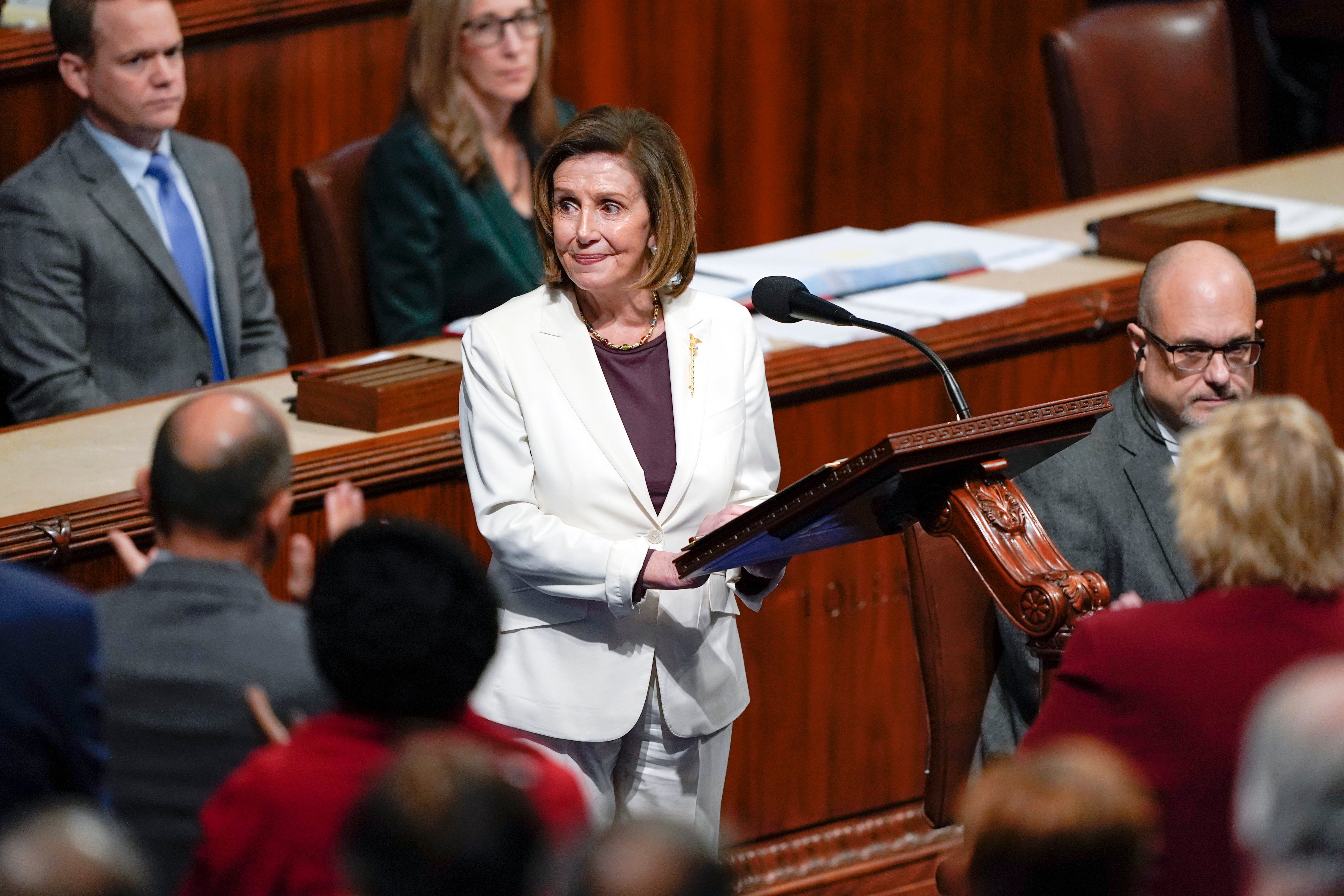The Independent's journalism is supported by our readers. When you purchase through links on our site, we may earn commission.
After Nancy Pelosi, get ready for a darker, weirder era in the House
We’re going to see partisan investigations into Hunter Biden, conspiracy theories about the IRS, Biden’s Afghanistan withdrawal, border policy at DHS, and more


Your support helps us to tell the story
From reproductive rights to climate change to Big Tech, The Independent is on the ground when the story is developing. Whether it's investigating the financials of Elon Musk's pro-Trump PAC or producing our latest documentary, 'The A Word', which shines a light on the American women fighting for reproductive rights, we know how important it is to parse out the facts from the messaging.
At such a critical moment in US history, we need reporters on the ground. Your donation allows us to keep sending journalists to speak to both sides of the story.
The Independent is trusted by Americans across the entire political spectrum. And unlike many other quality news outlets, we choose not to lock Americans out of our reporting and analysis with paywalls. We believe quality journalism should be available to everyone, paid for by those who can afford it.
Your support makes all the difference.It’s the end of an era and the beginning of a new, more unhinged one in House leadership. In a powerful speech that evoked history, Speaker Nancy Pelosi (D-CA) just announced that she will not run for a leadership post in the next Congress.
Pelosi’s legacy speaks for itself. She has been the Democratic leader in the House for 19 years, in Congress for 35 years, and is the first woman Speaker of the House. She leaves the leadership role with a stack of legislative and electoral victories behind her, from whipping votes for the Affordable Care Act to taking on Donald Trump.
Ahead of her announcement, sources told NBC News that Pelosi took home two different versions of her speech and still hadn’t made a definitive decision on which she would deliver. After her husband was attacked with a hammer by an alleged right-wing extremist in their San Francisco home, she’d said she would have to consider whether she could remain in House leadership. She ultimately chose to pass the baton to the next generation. Now, we look ahead to a likely incoming Speaker Kevin McCarthy (R-CA) — who is already facing demands from his more far-right Republican colleagues. They intend to make it obvious that he depends on their support.
Republicans are officially projected to win the House with a slim majority of just over 218 seats. Democrats have held the Senate with 50 seats, and may even expand their majority by one seat in the Georgia runoff next month. President Joe Biden will now oversee a divided government. The next two years in Washington will be a wild ride. From the usual spending fights that risk government shutdowns to more extreme actions, House Republicans will seek to make Biden’s life miserable.
While the majority is very slim in the House, Republicans are set to obtain newfound power in 2023. The GOP will have control over powerful House committees with investigatory subpoena powers, the ability to decide what bills are pursued and brought to the floor, and the capacity to impeach President Biden and his Cabinet members.
Remember the Trump-era House hearings filled with belligerent insanity? Get ready for dozens of those. We’re going to see partisan investigations into Hunter Biden, conspiracy theories about the IRS, Biden’s Afghanistan withdrawal, border policy at DHS, and more. Just this morning, Rep. Jim Jordan (R-OH), the incoming chair of the House Judiciary Committee with the voice of an angry auctioneer, confirmed their investigatory priorities. Jordan claimed they will target the "political nature of the Justice Department" and Hunter Biden. This was echoed in a 1,050-page report released earlier this month which serves as a roadmap to the bizarre avenues House Republicans are about to lead us down.
McCarthy will also face calls within his caucus to impeach President Biden. Given the GOP’s underperformance in the midterms, the country doesn’t appear to have the appetite for that, but they may pursue it nonetheless. What’s more likely is impeachment probes of Biden’s Cabinet members — like DHS Secretary Alejandro Mayorkas, who has been a favorite target of Republicans. A group of Democratic strategists is planning a counter-offensive on these probes, which will include paid media, rapid response teams, and investigative researchers to put Republicans on the defensive and expose their political motivations.
Meanwhile, the January 6 Committee will be shut down in the new year and perhaps replaced by probes into the committee itself. Elsewhere, Republicans will kick many prominent Democrats off their other committees — plans reportedly include removing Rep. Ilhan Omar (D-MN) from the House Foreign Affairs Committee, and Reps. Eric Swalwell (D-CA) and Adam Schiff (D-CA) from the House Intelligence Committee.
When it comes to legislation, lawmaking won’t be a priority. Expect House Republicans to push bills that will never become law, and are merely performative dances for their base. We’ll likely see bills that seek to legitimize the Big Lie under the guise of "election integrity" and other measures that will serve as bullhorns to the MAGA masses. One target is sure to be education. Republicans have exploited education, an issue that’s incredibly important to parents, as a catch-all for many of the culture wars they’ve waged over the past two years. From their fake outrage over Critical Race Theory, which isn’t taught in K-12 schools, to their attacks on trans youth, GOP members often use schools as a battleground to push their regressive ideology.
An indicator of exactly how they’ll pursue that can be found in a proposal released by McCarthy a year ago today called the "Parents’ Bill of Rights." The proposal is essentially a way to codify these culture wars into law. Ahead of the midterms this September, House Republican Conference Chair Elise Stefanik (R-NY) sent a tweet promising: "When Republicans earn back the House this November, we will pass our Parents’ Bill of Rights, expand school choice, and ensure that only women can compete in women’s sports." It’s clear the GOP will use this as a means to prey on their base’s fears of a changing America.
What will the Republican majority do to address real issues Americans face? Not much. Republicans have yet to present concrete plans and are very light on specifics when it comes to our most pressing challenges. The closest thing we have to outlined priorities comes from McCarthy’s Commitment to America one-pager and a recent CNN interview where he listed inflation, border security, and crime as top priorities. When it comes to inflation, the proposal McCarthy has presented is actually the same economic approach taken by the shortest-serving UK Prime Minister Liz Truss that recently sent the UK into near-economic calamity.
While House Republicans will certainly seek to make Biden feel under siege, McCarthy will be facing internal turmoil of his own. The narrow nature of their majority gives more power to extremist members of the House caucus like Reps. Marjorie Taylor Greene (R-GA) and Matt Gaetz (R-FL). McCarthy, who cozied up to Trump at Mar-a-Lago just days after condemning him for the January 6 insurrection, doesn’t have a record of a sturdy backbone resisting extremism. In fact, he’s already making concessions. According to The New York Times, during a closed-door meeting on Monday, far-right lawmakers including Rep. Greene extracted a promise from McCarthy that House Republicans will investigate Pelosi and the DOJ’s treatment of jailed January 6 rioters.
The Democratic majority in the Senate will serve as the sanity buffer for House Republicans. At the moment, with only 50 seats, Senate Democrats will still have the majority, with Vice President Kamala Harris bringing the tie-breaking vote. They will be able to continue confirming Biden-nominated judges to balance out the judiciary. They’ll continue to chair Senate Committees. Democrats will also bring bills to the floor to showcase their priorities and intentions ahead of the 2024 election.
Additionally, there’s a chance Democrats earn more power if Senator Raphael Warnock (D-GA) fends off the Republican challenge from Herschel Walker in the Georgia runoff. There are some key differences between a 51 and 50-seat majority. If Democrats get 51 seats, they will no longer have to have power-sharing agreements on Senate Committees with equal members and will have clear majorities. This would give them the ability to confirm Biden-nominated judges more easily and remove procedural hurdles on legislation. It also dilutes the importance of Senators Joe Manchin (D-WV) and Kyrsten Sinema (D-AZ), who presented some real roadblocks to Biden’s agenda in the past two years.
What does this mean for Senator Mitch McConnell (R-KY)? Well, he just fended off a laughably unsuccessful bid from Senator Rick Scott (FL) for Republican leadership, so he’ll continue to be Minority Leader — much to his chagrin.
The next two years will be interesting. Judging by their behavior and rhetoric heading into the new Congress, it doesn’t seem like Republicans have done much introspection lately. While it’s true the GOP won a slim majority in the House, it’s important to remember that Americans rejected the far-right, extremist side of the party by rejecting election-denialists in key battleground states and by keeping the Senate in Democratic hands.
Republicans have a habit of overplaying their hand. They’ll likely do so again in this next Congress, as they try to appease the worst impulses of the Republican base.


Join our commenting forum
Join thought-provoking conversations, follow other Independent readers and see their replies
Comments